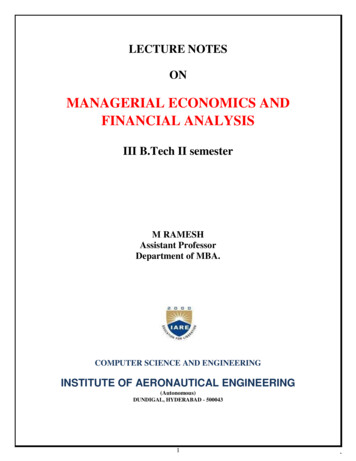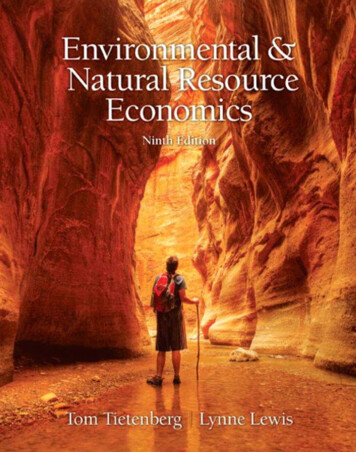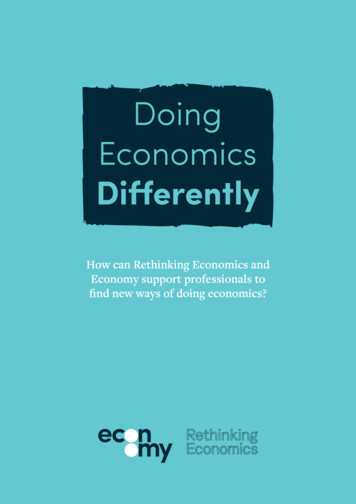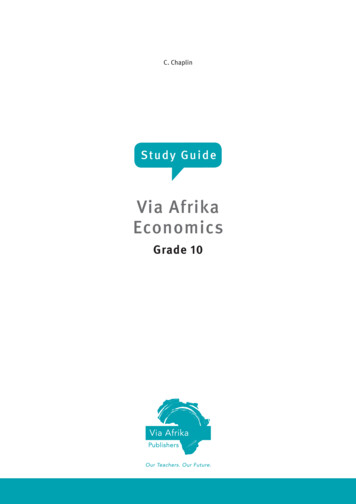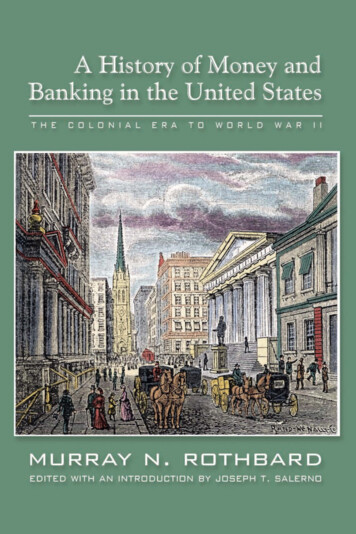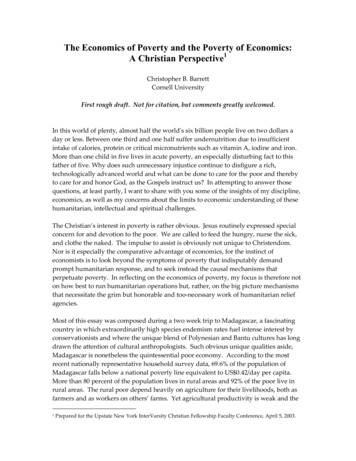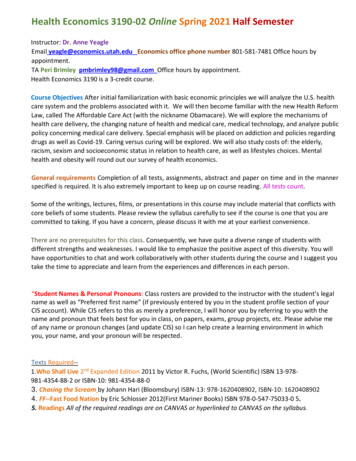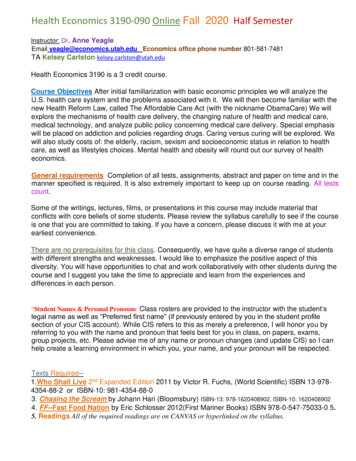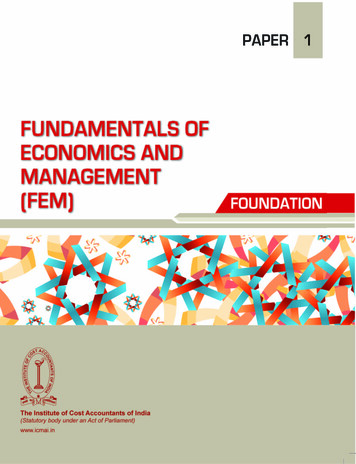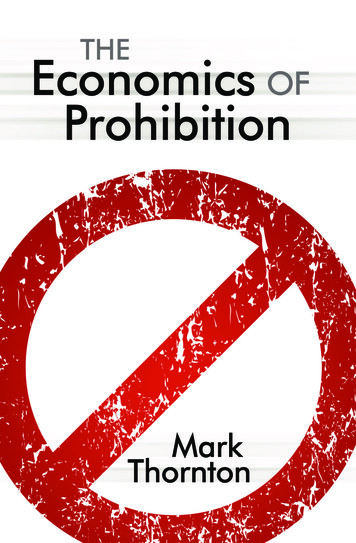
Transcription
The Economics of Prohibition
The Economicsof ProhibitionMark ThorntonUniversity of Utah PressSalt Lake City
Copyright 1991 University of Utah PressAll rights reservedo The paper in this book meets the standards forpermanence and durability established by theCommittee on Production Guidelines for Book Longevityof the Council on Library ResourcesLibrary of Congress Cataloging-in-Publication DataThornton, Mark.The economics of prohibition / Mark Thornton.p. cm.Includes bibliographical references and index.ISBN 0-87480-375-6 (alk. paper). — ISBN 0-87480-379-9 (pbk. :alk. paper)1. Prohibition—Economic aspects. 2. Prohibition—Economicaspects—United States. 3. Narcotics, Control of—Economic aspects—United States. 4. Drug traffic—Economic aspects—United States.5. Narcotics and crime—Economic aspects—United States. I. Title.HV5O88.T48 1991338.4'336341'0973—dc2O91-50333CIP
. ECONOMISTS AND PROHIBITION9The Origins of the "Economics" of ProhibitionIn Defense of Prohibition15Prohibition's Blue Monday23The Economics of Heroin Prohibition29The Economics of Addiction352. THE ORIGINS OF PROHIBITION1139The Prohibition of Alcohol40National Narcotics Prohibition56National Marijuana Prohibition653. A THEORY OF PROHIBITION71The Basic Analytics of Prohibition73The Political Economy of Prohibition844.THE POTENCY OF ILLEGAL DRUGS89The Economics of Potency92Prohibition as a Tax93The Impact of Prohibition on Potency95Potency in Prohibited Markets99Alcohol Prohibition100The Prohibition of Marijuana: A Simple TestBeyond Cannabis108105
VI5. THE CORRUPTINGEFFECTS OF PROHIBITION111Crime113Corruption1266. THE REPEAL OF PROHIBITION139Is Effective Prohibition Possible?142Alternative Policy Regimes146The Free-Market Solution149The Extended Free-Market Solution151References155Index167FIGURES1. Prohibition's Impact on the Consumer and Producer742. The Traditional Approach for Determining the Optimal Level ofProhibition Enforcement763. The Process of Progressive Interventionism (and exit)844. Effect of Improved Technology for High-Potency DrugProduction925. Federal Budget for Enforcement of Drug Laws,1973-19841066. Average Potency of Marijuana, 1973-19841087. The Impact of Prohibition on the Consumption ofHeroin1188. Prohibition's Impact on the Heroin Addict's BudgetConstraint1189. Prohibition's Impact on (addict-related) Criminal Activity11910. Federal Convictions of Public Officials, 1970-1988128TABLES1. Absenteeism Rates in a Delaware Gunpowder Plant262. Average Annual Percentage-Point Decline in Absenteeism in aDelaware Gunpowder Plant293. Shipping the Good Apples to New York944. Federal Expenditures upon the Enforcement ofProhibition1005. Fisher's "Alcohol Price Index," 1916-19281026. The Effect of Prohibition on Alcohol Expenditures1037. Per Capita Consumption of Alcoholic Beverages inGallons,1840-1919104
ForewordForeign wars come and go, but the Drug War is a constant of U.S.domestic policy. For nearly eight decades the government hasattempted to prevent American citizens from using one or more illicitsubstances. By the 1980s the government's efforts had become trulydraconian: more than one million drug arrests annually; minimumdrug sentences that exceed the average punishment for murderers andrapists; increasing numbers of wiretaps; property confiscations andhome evictions based on mere suspicion of drug use; ever morewarrantless searches as part of the constantly expanding "drugexception" to the Fourth Amendment; growing involvement of theCentral Intelligence Agency, Department of Defense, and NationalGuard; citywide curfews; and proposals for everything fromshooting down unidentified planes at the border to declaring martiallaw.Yet these efforts have yielded few positive results. The U.S. nowhas more than one million people in prison, yielding the highest rateof imprisonment in the industrial world. Young blacks are morelikely to die in gun battles in the criminal underground, funded bydrug prohibition, than they were while serving in the army inVietnam. Drug users seeking to pay the inflated prices of illegalsubstances commit thousands of property crimes in cities and theirsuburbs. Children, who receive lesser criminal punishments, areincreasingly recruited into the drug trade, where many become users.Moreover, the law appears to have stopped few people fromtrying illicit substances. According to the National Institute on DrugAbuse, 74.4 million people over the age of 12 have tried drugs, despitedecades of drug prohibition. Nearly 27 million use illegal substances
viiiThe Economics ofProhibitionat least once a year. Rates of drug use are now falling, but the declinesstarted before the periodic escalations of the drug war during the1980s.Given this record, it is time to fundamentally reevaluate America'sdrug policy. To do so risks attack from publicity-minded drug czarsand vote-seeking politicians. But not to do so acquiesces to a policythat is needlessly imprisoning, maiming, and killing tens of thousandsof people for voluntarily using and selling substances that aredemonstrably less harmful—particularly in the number of deathsthey cause—than the legal drugs alcohol and tobacco, the latter ofwhich is subsidized by the federal government.Courageously picking up the gauntlet tossed down by the drugwar lobby is Mark Thornton. In a debate more often marked byemotion than facts, Professor Thornton looks at how illegal drugmarkets, for alcohol as well as today's disfavored substances, reallywork. Particularly important is his conclusion that such problems ascrime and corruption are natural outgrowths of drug prohibition, notdrug use. As a result, the deaths of innocent bystanders in drugdealers' gun battles, for example, create an argument for druglegalization, not stricter enforcement.Many readers may nevertheless disagree with Professor Thornton's conclusions. But they will still have an obligation to respond tohis evidence that the costs of prohibition are huge and obvious, whilethe benefits are few and dubious. The burden of proving ProfessorThornton wrong, and thereby justifying continuation of the drugwar, now rests on those who oppose drug legalization.Cato InstituteD O U G BANDOW
AcknowledgmentsDuring my study of prohibition I have been helped by manyfriends and colleagues. Their encouragement, suggestions,and corrections made this book possible.My gratitude and respect go to John D. Jackson, who providedthe critical guidance so crucial to the completion of this project. Theunceasing stream of comments and suggestions from Richard D. Aultand Leland B. Yeager contributed both insights and a broadperspective. Seth A. Anderson provided valuable suggestions andencouraged me in my efforts to find a publisher.It is to the credit of my teacher, coauthor, colleague, and friendRobert B. Ekelund, Jr., that the lessons and debates in his classroomturned my question into an answer—an answer that forms thefoundation of this book.I owe a special debt to the University of Utah Press, whose staffhad the courage and foresight to bring this book to fruition. I am alsograteful to the distinguished group of reviewers assembled for thisproject—Bruce Benson, Charles Maurice, and Murray Rothbard—each of whom provided valuable comments and corrections.Three institutions have provided support for this project. TheInstitute for Humane Studies at George Mason University providedmy initial exposure to classical liberalism and academic research. Iwish to offer my thanks for the 1990 F. Leroy Hill Summer FacultyFellowship, and I give special thanks to Sheldon Richman for hisassistance in preparing this manscript for publication.I also wish to acknowledge the H. B. Earhart Foundation for itsfinancial assistance during the preparation of this book.IX
xThe Economics ofProhibitionMy very special thanks go to the members and staffof the Ludwigvon Mises Institute. The intellectual environment, continuousencouragement, and financial support they provided were invaluable.For their assistance and faith in me, I would especially like to thankLlewellyn H. Rockwell and O. P. Alford III.It is my hope that the publication of this book begins to repay allthose who have shown so much confidence in me.
IntroductionProhibition has an ever-increasing impact on our daily life. In theUnited States, prohibition against certain drugs, involving"wars" on them, has become one of our most visible and hotlydebated national problems. The purpose of the following investigation is to improve our understanding of the origins and results ofprohibition, and therefore indirectly to contribute to future policymaking, shifting it toward rationality.At the core of this book, one of the first theoretical investigationsof prohibition, is an economic theory of prohibition, which definesprohibition as a government decree against the exchange of a good orservice. Recent studies of decrees against cocaine, heroin, and marijuana suggest that these prohibitions impose heavy costs and areextremely difficult to enforce. Beyond such costs and enforcementdifficulties, however, I argue that effective prohibition is impossibleto achieve, because the unintended consequences of prohibition itselfpreclude any benefits.The only long-term solution to the problems engendered by the"misuse" of a product, I maintain, is legalization of that product.With legalization, as opposed to decriminalization and other forms ofgovernment interventionism, the government treats the misusedproduct or service as if it were soybeans, computer chips, or pencils.The market is controlled by self-interest and normal legal constraints,such as product-liability law.This book may be viewed as a challenge to prohibitionists topresent a theory that describes the benefits of prohibition. It may alsobe seen as a challenge to those who recommend that prohibition bereplaced with some form of decriminalization. While it may be a
Introductiongood transition policy, decriminalization (government drugstores,high taxation, high fines, etc.) would maintain a black market, is anunstable policy, and does not create the necessary preconditions forreversing or limiting drug abuse.I have made use of historical analysis and applications of theory inthis book, incorporating the disciplines of economics, history, criminology, sociology, and political science as needed. I have avoidedusing such items as estimates of elasticity and regression analysisbecause they are transient, unnecessary, and provide a false sense ofcertainty.The historical perspective transforms what might appear to be animplausible position into an eminently sensible one. The importanthistorical aspects I examine include the role of economists in prohibitions, the origins of prohibitions, product quality, crime rates, andpolitical corruption during prohibitions.There is little doubt about the importance of prohibition in American history and its role in social problems. The prohibition of alcoholsales was a crucial aspect of trade and tension with the indigenousIndian population. Temperance (along with slavery) was the primaryreform movement in antebellum America, and prohibition was adetermining political issue at the state and local level.After the Civil War, prohibitionism spread from New Englandboth west and south. Although sometimes perceived as a lull in thedrive for prohibition, the period from 1860 to 1900 saw the establishment of the building blocks of successful national prohibitions.Addiction was discovered, the Prohibition party was formed, groupssuch as the Women's Christian Temperance Union and the AntiSaloon League were established, and a wave of prohibitions at thestate and local level were enacted on alcohol, cocaine, opium, morphine, gambling, and prostitution.The Progressive Era (1900-1920) marks the pinnacle of Americanprohibitionism. As America "progressed" to become an imperialpower, it did so in part on the international prohibition of narcoticsand the Harrison Narcotics Act. The act also helped the medical anddrug industries "progress" toward the exalted monopoly status thatthey now enjoy.The Progressive Era also witnessed wartime prohibition of alcohol and National Alcohol Prohibition (the Eighteenth Amendment tothe U.S. Constitution). Never have so many been deceived about so
Introductionmuch by so few. The Eighteenth Amendment and the Volstead Act,which established the mechanism of the amendment's enforcement,would be decisive and negative factors in American life and culturefor over a decade.The failure of Prohibition helped remove it temporarily from public attention. Not only was the "noble experiment" an embarrassment, events such as the Great Depression and World War II dominated public concern. Marijuana prohibition in 1937 was relativelyinsignificant—a mere side effect of narcotics and alcohol prohibitions.The current prohibitions against narcotics originated with warand foreign-policy considerations in the Far East. In the 1960sforeign-policy considerations which resulted in war in Vietnambrought about increased consumption of drugs and the ensuingintensified war on drugs.One early lesson from American history is the unmistakable interaction between war, intemperance, and prohibition. Avoiding war isperhaps the most important thing a government can do to avoidintemperance, addiction, and drug abuse. Conversely, drug abuseand prohibitions are a significant long-term cost of war.History also supports the finding that prohibition is impossible toachieve in the economic sense. Legislatures do enact prohibitions andestablish penalties and enforcement bureaus. The actions of thesebureaus to enforce prohibition decrees have an effect, and when aprohibition survives long enough to be enforced it is successful in apolitical sense. I argue, however, that prohibitions have no sociallydesirable effect.Of course prohibition should not be evaluated against a higherstandard than other laws. Murder is against the law, but not all murderers are apprehended, convicted, and punished. Likewise, to expectcomplete or perfect prohibition is unrealistic. Rather, prohibition willbe measured against its public-spirited intentions, that is, to reduceconsumption of a good in order indirectly to reduce social ills (such ascrime, destruction of free will, drug-related deaths) and to promotesocial goals (family life, democracy, health, and economic development).To the extent that prohibitions result in increased prices, they produce increased crime and political corruption. Higher prices for aprohibited product also result in the substitution of related products
Introductionand the innovation of more dangerous substitutes. Prohibited products tend to be more dangerous than legal substitutes in manyrespects, the result of prohibition, not the product itself Therefore, toassume that more severe penalties or increased enforcement willresult in the substitution of legal for prohibited products is to make aninvalid conclusion. Prohibitions on drugs cause potency to increase.Therefore, the assumption that higher prices achieve the goals of prohibition is unfounded. Given all such considerations, the case for prohibition remains unfounded even if the indirect connection betweenthe consumption of certain products and social ills does exist.The attempt to understand all human action (as opposed to justcommercial activity) as rational represents a revolution in thought.Applied to policy decisions, this revolution is called public-choiceeconomics, and from this perspective it is unacceptable to presentprohibition as an ignorant, irrational, or impossible social policy.Economists now suspect that any net losses to society producedby government policies are the result of rent seeking rather than ignorance or irrationality on the part of policymakers. Rent seeking is asearch for privilege and personal gain through the political process.Rent seeking is distinguished from corruption in that rent seeking is legaland corruption is not.History reveals that prohibitions are indeed classic examples of theco-opting of public-spirited intentions by rent seekers within thepolitical process, thereby explaining the existence of what at firstappears to be irrational policies.This rationality-based method for the study of human action waslabeled praxeology by the Austrian economist Ludwig von Mises.His student F. A. Hayek, a Nobel laureate, called it the logic of choice.Contemporary economists will recognize this approach as developedby Gary Becker. Other social scientists, notably political scientists,criminologists, and psychologists, will no doubt recognize thisrationality-based approach as one which has become part of theirown disciplines.Although such an outcome is unintentional on my part, this bookwill prove threatening to many. Some will label the theory in it doctrinaire, apologetic, capitalistic, or liberal. Specialists may find it lacking for neglecting the role of addiction or for failing to consider certain estimates of elasticity, particular chemical compositions, or the
Introductionrole that unusual circumstances have played in particular markets atpoints in time.In fact, however, many of the problems that economists and othersocial scientists have had with prohibition is that they have proceededwith investigation of specific markets without the benefit of a generaltheory.One last warning is in order, and it cannot be emphasized enough.The markets in which prohibition has been deployed, such as gambling, intoxicants, and prostitution, have existed for a long time andwill continue long after I and my book turn to dust. Prostitution is theworld's oldest profession; people have been using intoxicants for aslong as history can record; and men and women are risk-taking, funloving creatures. Most human beings live for leisure, not for labor.Labor is merely a means to an end.No matter how deplorable the above activities appear to some,they are "leisure" to others. The only consistently successful methodfor raising the standards of leisure to higher levels is to allow economic development to take place. Individuals who use certain products or activities to self-destruct have problems far worse than thevisible ones. Prohibition of these goods or services will have littleimpact in such cases.It is also important to recognize that the problems in these markets(disease, fraud, broken families, and so on) are not the result of a lackof government involvement. Indeed, these markets have been historically characterized by extensive government involvement prior to theenactment of prohibition.It is hoped that this book will stimulate debate, in both the academic and policy communities, even among those who disagree withaspects of it, and by that debate move us to a more rational publicpolicy.
1Economists and ProhibitionI hold that there is nothing much wrong with standard economic methodology as laid down in the first chapter of almostevery textbook in economic theory; what is wrong is thateconomists do not practice what they preach.—Mark Blaug, The Methodology of EconomicsSince economists have been leading the battle against drug prohibition, most people would be surprised to learn that they playedan important role in establishing and defending the alcohol prohibition of the 1920s. It is still an open question whether economists setpublic opinion or mirror it, but the relationship between economistsand prohibition provides interesting insights into the economics profession, the origins of Prohibition, and the current debate over druglegalization.In recent years economists have led the fight to legalize—actually,to rdegalize—drugs. The Nobel Prize-winning economist MiltonFriedman has been the outspoken leader of the relegalization forces.His open letter to "Drug Czar" William Bennett, published in theWall Street Journal, is just his latest salvo against the prohibitionistestablishment.1 Friedman began this battle in the 1960s, writing inNewsweek that the prohibition of drugs was ineffective and that morereasonable and prudent approaches to the problems of drug abusewere available. He (with his wife, Rose Friedman) later attacked drugprohibition in Free to Choose and The Tyranny of the Status Quo, linkingthe harm it causes with the experience of alcohol prohibition in the'See Friedman 1989.
10The Economics ofProhibition1920s. The Friedmans are careful observers of history who opposedrug prohibition both on ethical and practical grounds.One of Friedman's former colleagues at the University of Chicago, Gary S. Becker (1987), has also come out strongly against drugprohibition in the popular media. His support for the relegalization ofdrugs is significant because of his status in the profession, and for hispotential as a Nobel Prize winner in economics. Becker argues thatprohibition is not working and that the costs far outweigh the benefits. He bases his position both on current findings and on his owntheoretical research. Becker is the foremost current authority andadvocate of the rationality assumption regarding the study of humanbehavior. Among his numerous articles on the economics of humanbehavior is his recently published "A Theory of Rational Addiction"(with Kevin Murphy), in which addiction is modeled as rationalbehavior.Another important economist to announce support for legalization is the former secretary of state George Shultz. Since Shultz was akey member of the Reagan administration, his public statement is amajor development in the debate over drug policy. The pro-legalization position of William F. Buckley, Jr., and Shultz's conversion tolegalization mark a major turning point in conservative thought.A survey of economists indicates that the majority oppose prohibition and favor moving policy in the direction of decriminalization.Economists who specialize in monetary theory and public finance aremore likely to support decriminalization, while specialists in businessadministration are more apt to defend prohibition. Economists whowork in the private sector generally support decriminalization,whereas government economists are more likely to support prohibition. It should be noted that economists overwhelmingly fall withinthe demographic grouping that exhibits the most support for legalization within the general public (middle aged, male, highly educated,upper income, Jewish or nonreligious). Most graduates of the topgraduate programs and most economists trained in the Chicago, public choice, or Austrian traditions supported decriminalization of illegal drugs (Thornton 1991).The growing importance of and interest in prohibition has ledsome economists to include discussions of laws against alcohol,drugs, gambling, and pornography in their textbooks. Normallyrestrained and politically neutral, several writers of economic text-
Economists and Prohibition11books have taken a skeptical view of all prohibitions. For example,when examining the current drug prohibition, Edwin G. Dolan andJohn C. Goodman (1989, 35) present "misgivings raised on groundsof efficiency, equality, and liberty." Robert B. Ekelund and Robert D.Tollison (1988,108) find that "(e)conomic analysis casts doubts on theeffects of directing increased resources into enforcement withoutcareful analysis of the probable consequences of such programs," andthey suggest "that government expenditures would be better directedto the demand side of the problem."2Richard McKenzie and Gordon Tullock (1989), too, place a warning label on prohibition. They find that "the costs of enforcementshould, perhaps, be taken into account now in evaluating the efficacyof contemporary laws against hard drugs or pornography" (7). McKenzie and Tullock also assert that economists have always been inagreement against prohibition and have been aware of the tremendous costs, as if alerted by some standard economic model: "If backers of prohibition had consulted economists, we are sure they wouldhave been told that the law would be very difficult and expensive toenforce. With this advice they might have decided not to undertakethe program of moral elevation" (7; emphasis added).It is true that economists were in substantial agreement during theformative years of national alcohol prohibition. But they were for it—not against it.THE ORIGINS OF THE "ECONOMICS" OF PROHIBITIONEconomists helped establish the case for prohibition during theProgressive Era, a time when they were professionalizing their discipline and when a movement toward government interventionismand socialism, promoted by the German Historical School, was displacing the classical liberal approach to political economy. Membersof the German Historical School rejected economic theory in favorof the study of history and institutions. Derived from Germanromantic philosophy (Hegelian determinism) the School advocatedthe use of laws as a means to social reform.Graduates of the German Historical School, principally Richard2Ekelund and Tollison's conclusions are based in part on Thornton 1986,an earlier version of chapter 4 of this book.
12The Economics of ProhibitionT. Ely, founded the American Economic Association in 1890. Theassociation was modeled after German academic associations thatallied themselves with the German state. Many market-orientedeconomists threatened to boycott the new organization because of itsoutwardly political bias. Once its socialistic statement of principlewas dropped, however, the association became widely accepted.Many of the founding members were raised in puritanical households of postmillennialist pietism.3 During their days as universitystudents many became atheists, substituting a secular approach toperfectionism for the religious approach of their parents. Some, suchas Richard T. Ely, adopted a prosocialist orientation, while others,such as John Bates Clark, adopted a "dog-eat-dog" evolutionaryperspective on capitalism. What they shared was an evangelical outlook and a strong dislike of such products as alcohol.4One of the founding members of the association and a leadingproponent of prohibition was Simon N. Patten. Patten was a misfit.Handicapped by poor health and eyesight, he was unsuited for traditional pursuits and was considered the oddball of his prosperousfamily. Born into a traditional Yankee puritan home, Patten becamean intellectual and agnostic. After several setbacks in his life he wentto Germany, where he was trained by a leader of the German Historical School, Karl Knies. Upon returning to America he couldnot find a job until he was hired by fellow supporters of protectionism and friends at the Wharton School of the University ofPennsylvania.A. W. Coats (1987) describes Patten as original and idiosyncratic,his publications unusual and eccentric. Patten's contributions "were3Postmillennial pietists believe that there will be a thousand-year kingdomof God on earth and that it is man's responsibility to establish the necessaryconditions as a prerequisite for Jesus' return.4In a sobering passage, Newcomb (1886, 11-13) used the drinking of alcohol (i.e., "gratifying the morbid appetite") to distinguish correctly betweenthe sphere of moralists and the role of political economists—to separate "thetotally different. . . questions whether an end is good and how an end can bestbe attained." Newcomb suggests that the "economist might say in conclusion" that he knows "of no way in which a man can be made to accept thatwhich he desires less in preference to that which he desires more, except positive restraint."
Economists and Prohibition13intriguing but puzzlingly novel and unsystematic, yet his awarenessof the costs of growth and his concern for the environment anticipated late 20th century anxieties" (818-19). Despite extensive writings and his role as a founder (and later president) of the AmericanEconomic Association, Patten is remembered not for his theories butfor his "prophecies."One such prophecy was the advent of alcohol prohibition inAmerica. Patten was a pluralist, believing that a policy is neither allgood nor all bad and that a policy may very well be good for onecountry but disastrous for another. He wrote in 1890 that alcoholprohibition was a good policy for America and that abstinencewould be the inevitable result of evolutionary competition.Prohibition was both desirable and inevitable in America fromPatten's evolutionary perspective. Patten based his conclusion onthree main factors: (1) severe weather variation in America results inheavy and irregular alcohol consumption; (2) the custom of "treating" in America results in people consuming a greater quantity andvariety of alcoholic drinks than if they relied solely on their owndecisions; (3) technological advance resulted in the production ofhigher-potency and lower-quality alcoholic beverages. All three ofthese conditions were relative to conditions in Germany, where Patten was trained and where prohibition was apparently unnecessary.Patten seems to argue that prohibition must be adopted if we areto "survive." Temperate people will "outcompete" heavy-drinkingsocieties in terms of longevity, prodigy, and wealth. Temperate societies will overcome the intemperate because a given amount of landcan support two temperate people or one heavy drinker. Americawill decline as the soil is exhausted in an attempt to support a nationof drunkards. For Patten, prohibition is a great evolutionary battleground because America must go dry if it is to survive and prosper:"Separate out the good in society from the bad, and you take fromthe bad many of the restraints which keep them from crime. In thisway every measure that makes the good better makes the bad worse.The sharper the lines are drawn between the two classes, the morewill the good progress and the quicker will the bad run through theirdownward course. With prohibition it is easier to be good and moredangerous to be bad" (1890, 65).For Patten, alc
There is little doubt about the importance of prohibition in Amer-ican history and its role in social problems. The prohibition of alcohol sales was a crucial aspect of trade and tension with the indigenous Indian population. Temperance (along with slavery) was the primary reform movement in antebellum America, and prohibition was a

